Frankincense essential oil has been used for centuries in traditional medicine and is still widely used today. There are many potential benefits of frankincense oil, including its ability to reduce inflammation, relieve pain, and improve respiratory health. Frankincense oil is also said to boost the immune system, fight depression and anxiety, and promote healthy skin.
Essential Oil Profile / Monograph
Botanical Name: Boswellia Carterii
Common Names: Olibanum, Frankincense
Plant Family: Burseraceae
Countries of origin: Somalia, Oman, Yemen
Extraction Method: Steam Distillation
Parts Used: Resin
Absolute smell: Warm, woody, spicy
Absolute Color: Yellow to reddish brown
Viscosity: Medium
Perfumery Note: Middle
Strength of Aroma: Strong
Blends Well With: Bergamot, Clary Sage, Lavender, Myrrh, Peppermint, Rosemary, Tea Tree
Therapeutic Properties: Analgesic, anti-inflammatory, antiseptic, astringent, carminative, cicatrizant, cytophylactic, digestive, diuretic, expectorant, immunostimulant, sedative
Uses: Arthritis, bronchitis, colds/flu, colic, Crohn’s disease/ulcerative colitis, diarrhea, dyspepsia, flatulence, hair care, hemorrhoids, immunostimulant/booster, indigestion, inflammation (all types), irritable bowel syndrome (IBS), mature skin care, nerve pain/damage, psoriasis, scars/stretch marks
Contraindications: Avoid during pregnancy, breastfeeding, and for children under the age of two. Also avoid if you have gallstones or are about to undergo surgery.
Side Effects: Rare side effects can include nausea, vomiting, and skin irritation.
Types: Carteri (Boswellia carterii), Frereana (Boswellia frereana), Sacra (Boswellia sacra)
Chemical Constituents: Alpha-pinene (11-17%), limonene (16-22%), camphene (trace-14%), beta-pinene (trace-12%), myrcene (trace-11%), alpha-thujene (trace-11%), sabinene (<11%), beta-phellandrene (<11%), terpinolene ( trace-16%), linalool (0.33-0.83%), terpinen-lolo (0.17-12.50%), octanol (<0.83%), incensole acetate (trace-0.50%), octyl acetate (trace-0.50%), dodecanol (0.33-0.50%), ledol (trace), terpineol (<0.17%), alpha-terpineol (trace), beta-terpineol (<0.17%), geraniol (<0.17%)
What is Frankincense?
Frankincense is an aromatic resin that is derived from the Boswellia tree. This tree is native to Somalia, Oman, and Yemen and has been used for centuries in traditional medicine. The resin is obtained by making incisions in the tree bark, which allows the sap to leak out and harden. Once hardened, the resin is then collected and steam distilled to create the essential oil.
Benefits
Frankincense oil health benefits include reducing inflammation, boosting immunity, relieving pain, and improving digestion. Additionally, it is often used as a natural remedy for anxiety and stress.
Frankincense essential oil for skin: Its ability to improve skin tone and elasticity, reduce the appearance of scars and stretch marks, and fight inflammatory skin conditions like psoriasis, makes it one of the best essential oils for skincare.
Frankincense essential oil for hair: It can also be used to improve hair health. It is said to stimulate hair growth, prevent dandruff, and soothe an itchy scalp.
Frankincense essential oil spiritual benefits: Frankincense has been used in religious and spiritual ceremonies for centuries. It is said to promote feelings of peace and calm, and can be used as an aid in meditation.
Uses
It can be used in a variety of ways, including diffusing it into the air, applying it topically to the skin, and taking it internally.
Internal Use
When taken internally, It is thought to help improve digestion, reduce inflammation, and boost immunity. Do not take it internally without consulting your doctor. It may interact with other drugs.
Topical Use
When applied topically it helps reduce pain and inflammation. It can be diluted with a carrier oil and applied to the skin.
For bathing
To use frankincense essential oil in a bath, add five to ten drops of the oil to a warm bath. You can also add a carrier oil, such as jojoba or almond oil, to help the essential oil disperse evenly in the water.
Diffuser Blends
For stress and anxiety: Frankincense, lavender, and bergamot
For immunity: Frankincense, lemon, and eucalyptus
For inflammation: Frankincense, peppermint, and ginger
For pain relief: Frankincense, chamomile, and rosemary
For skin health: Frankincense, sandalwood, and lavender
For relaxation: Frankincense, ylang ylang, and jasmine
For focus: Frankincense, rosemary, and basil
Historical Use
Frankincense has been used for centuries in traditional medicine. In ancient times, it was often used to treat a variety of ailments, including digestive issues, inflammation, and pain. Today, it is still used as a natural remedy for many of the same conditions.
For kids
It is generally considered safe for kids when used in low concentrations. However, it should always be diluted with a carrier oil before being applied to the skin. It is also important to avoid giving frankincense essential oil to children under the age of six.
For Pets
It is safe for use on pets when diluted with a carrier oil. When applied topically, it can help to reduce inflammation and relieve pain. It can also be diffused into the air to help improve digestion and boost immunity.
DIY recipes
Face Cream:
Ingredients:
-½ cup shea butter
-¼ cup coconut oil
-20 drops frankincense essential oil
Instructions:
Whip the shea butter and coconut oil together until light and fluffy. Add the essential oil and mix well. Apply to the face and neck as needed.
Body Butter:
Ingredients:
-½ cup cocoa butter
-¼ cup shea butter
-¼ cup coconut oil
-20 drops frankincense essential oil
Instructions:
Melt the cocoa butter, shea butter, and coconut oil together. Remove from heat and stir in the essential oil. Pour into a jar and let cool. Apply to the body as needed.
Bath Bombs:
Ingredients:
-½ cup baking soda
-¼ cup citric acid
-¼ cup cornstarch
-½ tsp water
-20 drops frankincense essential oil
Instructions:
Mix the baking soda, citric acid, cornstarch, and water together. Add the essential oil and mix well. Pack the mixture into silicone molds. Let dry for 24 hours before using.
Natural Sugar Scrub:
Ingredients:
-½ cup sugar
-¼ cup jojoba oil
-20 drops frankincense essential oil
Instructions:
Mix the sugar, jojoba oil, and essential oil together. Apply to the skin in a circular motion. Rinse with warm water.
Herbal Soap:
Ingredients:
-½ cup liquid castile soap
-¼ cup frankincense hydrosol
-20 drops frankincense essential oil
Instructions:
Mix the liquid castile soap, frankincense hydrosol, and essential oil together. Pour into a mold and let set for 24 hours. Cut into bars and use as desired.
Frequently Asked Questions
Who should not use Frankincense oil?
Pregnant women and nursing mothers should not use frankincense essential oil. It can also thin the blood, so people who are taking medication to reduce their risk of blood clots should talk to a doctor before using it.
Does Frankincense oil interact with any medicine?
Frankincense oil does not interact with any medicine. However, it can thin the blood, so people who are taking medication to reduce their risk of blood clots should talk to a doctor before using it.
Does Frankincense oil have medicinal property?
Yes, frankincense essential oil has anti-inflammatory and anti-bacterial properties. It can also help improve circulation and reduce stress.
Can Frankincense oil remove wrinkles?
Frankincense essential oil can help improve the appearance of fine lines and wrinkles. It is also said to help tighten the skin and make it look more youthful.
Is Frankincense oil good for skin?
Yes, frankincense essential oil is good for the skin. It can help to reduce inflammation and improve circulation.
Is Frankincense oil good for hair?
Frankincense essential oil can help to improve the appearance of your hair. It is also said to help with dandruff and dry scalp.
Is Frankincense oil safe for cats and dogs?
Yes, frankincense essential oil is safe for cats and dogs. However, it is always best to consult with a veterinarian before using any essential oils on your pet.
This website does not provide medical advice.
All information provided on this website, and on associated social media networks, including but not limited to texts, images, and numbers are for general information purpose only. It is not intended as medical advice and it does not include all possible precautions, side effects, or interactions that may occur. Neither NaturalLivingOnline.com nor its author/founder take responsibility for how you use this information. Statements contained on NaturalLivingOnline.com have not been evaluated by the FDA. You should conduct thorough research via multiple sources and consult your physician or qualified doctor before using any essential oil or herbal remedy. Information on NaturalLivingOnline.com must not be relied upon for medical, legal, financial or other decisions.












